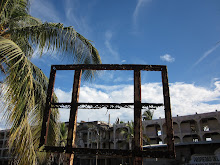Jesus fucking Christ I wanted to shoot myself in the face after this was over. Having never seen Russian drama performed before, but aware of its reputation, I knew I was not going in for a gay romp with Adolf and Eva. But I wasn’t expecting how utterly bleak the worldview presented would be.
I wonder if Chekhov believed what he was writing, or he was using it as a platform for social commentary and discussion. I sincerely hope he was using it as a platform. Because if life sucks and you work your ass off for other people who don’t appreciate you, then they show up, still don’t appreciate you, actively try to thwart your interests while completely ignoring everything you’ve done for them, leave, and everything promises to remain exactly the same…What. The. Fuck. (Note to self: after re-reading what I have just written, there’s no way Chekhov could have believed that that was OK. There’s no way that any reasonable person can believe that that is OK.)
The thing that I found most depressing about Uncle Vanya is that there was no point in the past or in the present, and no hope given for the future, that people would be happy. Everyone had been miserable before and everyone would continue to be miserable. Except for the professor everyone was working to support, that is. He would be ensconced in his sense of superiority just fine. But for everyone else, there was not even the slightest glimmer to hint at why things stayed the same, other than arbitrary duty.
There was no reason that Vanya had to spend his life toiling on the plantation other than a sense of familial responsibility that was not reciprocated by the man he was helping support. When that support is not reciprocated, but stomped upon and spat back on Vanya’s face, Vanya tries to take a stand. But this is crushed by his mother, and her sense of duty and obligation. Vanya is stuck because he never set out on his own – but I am sure that he never thought his life would turn out to be so worthless as it ended up being. Maybe there was hope originally, when he was young. But by the time the play takes place, it is gone.
With Long Day’s Journey into Night, at least it is made clear that everyone used to be happy, that the fucked up family was once life worth living. With Uncle Vanya, that is not the case. Maybe it’s a difference in American as opposed to Russian cultural outlook. Maybe Americans fool themselves for a time before life sets in and becomes nasty, and Russians take it for granted that life will be entirely nasty. But, speaking as a self-fooling American here – why does it have to be that way? And does it?

No comments:
Post a Comment